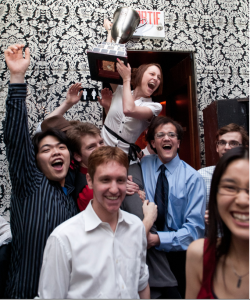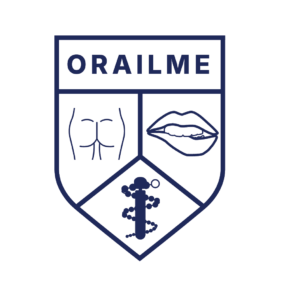
Students of the Computer Science program basking in their victory after the CS games competition. Courtesy of Alexander Mathieu.
While you may have spent the weekend of March 4-6 partying in celebration of spring break, or in a state of blissful oblivion about anything homework related, 18 dedicated members of UR’s Computer Science program were engaged in three days of intense computer programming at the prestigious 2011 Computer Science Games.
The annual competition, held this year at Concordia University in Quebec, Canada, drew over 300 undergraduate students to a weekend of high pressure coding.
Rochester’s A-Team beat out 31 universities from both Canada and the U.S. to earn the coveted first place cup for the third time in six years. They won with a dominating composite score of 75.96 out of 100, a full 10 points higher than second place. In the first year that two teams from Rochester have competed, the B-Team garnered 11th place with 48.47 points.
The CS Games, organized this year around the theme of science, consisted of 15 specific competitions that measured skills in both computer science and team relationships. The University’s A-Team, composed of ten undergraduates, earned a perfect score in six. The competitions, usually three hours each for two or three members of each University’s team, included artificial intelligence, gaming, team software engineering, puzzle hero, sports (serving as a well-needed break from the hours of programming) and a scavenger hunt around Quebec.
Under the direction of the Computer Science Undergraduate Council (CSUG) and president and junior Sam Atlas, tryouts for both teams were held in the fall.
“We wanted to make it more legitimate this year,” Brad Orego, a Take Five Scholar and vice president of CSUG, explained. “Basically, we took some programming questions from last year’s Extreme Programming Competition and gave people an hour to do as many as they could.”
Orego, who has been a leading member of Rocheser’s CS Games team for the past three years, said that they placed underclassmen on the B-Team in order to “give younger students an opportunity to see what it’s like in competition and what life is like outside UR Computer Science.”
Harry Ledley, a junior on the A-Team who has extensive programming experience and will be interning with Google this summer, used his skills in sports to earn Rochester a second place finish in that part of the Games. He also participated in Puzzle Hero, a weekend long event that “was a fun thing to do while not competing, but still difficult enough to make us think.”
“The style of the Games is similar to competitions like the Google Code Jam and the Facebook Hackathon,” Ledley said. “But even with my experience from previous internships, I’ve never felt so pressured to finish a project in a matter of hours.”
Julian Lunger, the sole freshman to make the A-Team, had to create a fully compatible version of a computer game in three grueling hours in the Game Development competition. He also earned Rochester points in the sports competition with teammate Ledley and participated in Puzzle Hero, Gaming and the scavenger hunt.
As a first time competitor, Lunger said he was most impressed by the level of camaraderie he experienced not only among members of the UR team, but among all the universities, regardless of language, nationality or competitiveness.
“What was really amazing about the whole weekend was the spirit everyone had,” Ledley said. “Everyone was socializing with everyone. It didn’t matter what school you were from or what country you were from… No matter what was going on, everyone was psyched to do anything they could to help.”
In addition to extreme dedication, Orego said that Rochester’s teams excel in the competition every year because of the the University’s curriculum. UR is “capable of doing all aspects of the competition while other teams seem to only excel in one area,” Orego said.
“I think that the cluster system really helps our teams,” Marty Guenther, coordinator of the Undergraduate CS Program, concurred. “Our kids tend to work more collaboratively and with more confidence. They can lead a group. The CS curriculum at Rochester is more broad than it is at many technical schools that seem to have tunnel vision, whereas at Rochester more than 50 percent of CS students double major or minor in another discipline.”
The members of Rochester’s CS team exemplify this point: Sophomore Emily Danchik, captain of the B-Team and social chair of CSUG, is a double major in CS and Linguistics and a music minor. Brad Orego has a double major in CS and Psychology and a minor in Spanish and is taking his fifth year in BCS and Art. Julian Lunger is pursuing electrical engineering to accompany CS.
In addition to organizing her team members, Danchik participated in Extreme Programming and Debugging. Debugging is a competition that presented students with lines upon lines of coding containing only a few errors. Using one computer, she and teammate Dan Bartkowski had to identify the errors and then correct them.
“It was a really interesting experience to be one of only two teams that didn’t speak French,” Danchick said, who described the atmosphere as “work hard, play hard.”
“Even though they had us working 20 hours a day, it was a really relaxed competition because of the sense of camaraderie.”
The members of Rochester’s winning A-Team were Take Five scholars Brad Orego and Andrew Keenan Richardson, seniors Robin Miller and Scott Ames, juniors Sam Atlas, Josh Pawlicki, Harry Ledley and Rintaro Kuroiwa, sophomore David Klein, and freshman Julian Lunger. Members of the B-Team were seniors Chris Hill, Dan Bartkowski and Mike Garber-Barron, junior Darcey Riley, sophomore Emily Danchick, and freshmen Chris Miller, Hap Willis and Philip Cohn-Cort.
Buletti is a member of
the class of 2013.

